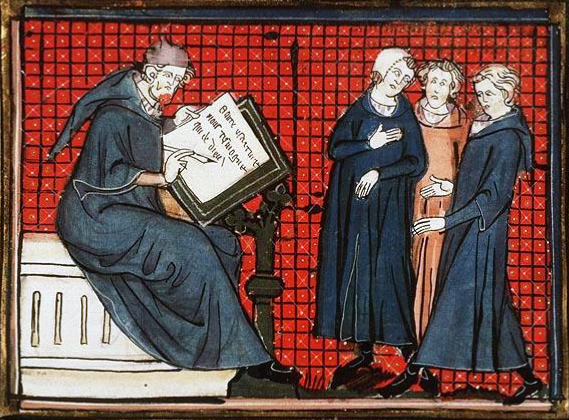Gautier De Coincy on:
[Wikipedia]
[Google]
[Amazon]
 Gautier de Coincy (1177–1236) was a French
Gautier de Coincy (1177–1236) was a French
List of recordings of works by Gautier de Coincy
(courtesy of th
Early Music FAQ
 Gautier de Coincy (1177–1236) was a French
Gautier de Coincy (1177–1236) was a French abbot
Abbot is an ecclesiastical title given to the male head of a monastery in various Western religious traditions, including Christianity. The office may also be given as an honorary title to a clergyman who is not the head of a monastery. The ...
, trouvère
''Trouvère'' (, ), sometimes spelled ''trouveur'' (, ), is the Northern French ('' langue d'oïl'') form of the '' langue d'oc'' (Occitan) word ''trobador'', the precursor of the modern French word ''troubadour''. ''Trouvère'' refers to poet ...
and musical arranger, chiefly known for his devotion to the Virgin Mary
Mary; arc, ܡܪܝܡ, translit=Mariam; ar, مريم, translit=Maryam; grc, Μαρία, translit=María; la, Maria; cop, Ⲙⲁⲣⲓⲁ, translit=Maria was a first-century Jewish woman of Nazareth, the wife of Joseph and the mother of ...
.
While he served as prior of Vic-sur-Aisne he compiled ''Les Miracles de Nostre-Dame'' (known in English
English usually refers to:
* English language
* English people
English may also refer to:
Peoples, culture, and language
* ''English'', an adjective for something of, from, or related to England
** English national ide ...
as ''The Miracles of Notre Dame'' or ''The Miracles of Our Lady'') in which he set poems in praise of the Virgin Mary to popular melodies and songs of his day. It is a reverential but humorous work, full of love for the cult of the Virgin Mary, which at that time also received attention from Saint Bernard of Clairvaux
Bernard of Clairvaux, O. Cist. ( la, Bernardus Claraevallensis; 109020 August 1153), venerated as Saint Bernard, was an abbot, mystic, co-founder of the Knights Templars, and a major leader in the reformation of the Benedictine Order throug ...
who was the leading medieval proponent of veneration of the Virgin as a counterbalance to the more rigorous Christian scholasticism, then the dominating spiritual force.
Unlike Clairvaux's more sombre tomes, de Coincy's book (whilst sharing much of the same ideological bedrock) tends more towards the indulgent or soft-hearted. Many of the songs de Coincy wrote were set to popular ballads then in vogue at the royal court, or borrowed the tune of pastoral or romantic ditties. ''The Miracles of Our Lady'' is one of the most popular works of Marianist literature from the period and it encapsulates a very particular set of Christian values, which saw in the Virgin Mary the most benevolent and humanistic aspect of salvation, intercession and mercy. Many of the songs are concerned with the key elements of the Virgin's earthly life - her conception, her birth, her childhood, her youth in the Temple
A temple (from the Latin ) is a building reserved for spiritual rituals and activities such as prayer and sacrifice. Religions which erect temples include Christianity (whose temples are typically called churches), Hinduism (whose temples ...
, the events recorded in the Biblical gospels and her Dormition
The Dormition of the Mother of God is a Great Feast of the Eastern Orthodox, Oriental Orthodox, and Eastern Catholic Churches (except the East Syriac churches). It celebrates the "falling asleep" (death) of Mary the ''Theotokos'' ("Mother of ...
; the poems and stories are generally more concerned with her modern-day miracles.
On the subject of the Virgin's interaction with the contemporary faithful, one modern historian describes de Coincy's view of Mary thus: -
"The more raffish the Virgin's suppliant, the better she likes him. The miracles' heroes are liars, thieves, adulterers, and fornicators, footloose students, pregnant nuns, unruly and lazy clerics, and eloping monks. On the single condition that they sing her praises, usually by reciting the ''Ave Maria'', and show due respect for the miracle of the Incarnation wrought in her, they can do no undamentalwrong. Her justice is loyalty to her own: whatever his conduct, anyone pledged to her protection is her liegeman and she his responsible suzerain. Through her the whole gay crew of wanton, loving, weak humanity finds its way to Paradise..."M. Warner, ''Alone of All Her Sex: The myth and the cult of the Virgin Mary'' (London, 1976), p. 324-5
In many ways, de Coincy rejected the strict Pauline morality that would come to characterise later denominations of Christianity, especially counter-Reformation Catholicism and Protestantism
Protestantism is a branch of Christianity that follows the theological tenets of the Protestant Reformation, a movement that began seeking to reform the Catholic Church from within in the 16th century against what its followers perceived to b ...
, which placed a great effort on self-denial and renunciation. In their immediate context, they were written to please de Coincy's own congregation and to present a softer form of Christianity in reaction to the hardline stance of the nearby cathedral-chapter at Beauvais, which had staged various plays savagely satirising secular pursuits as inherently wrong and damaging to one's spiritual life. This perhaps explain why de Coincy chose to express his own more liberal, Marianist views through the same exploitation of secular forms of presentation - in his case, poems and music.
Much of de Coincy's music is still performed and recorded, most recently by The Harp Consort.
Recordings of Gautier de Coincy's Works
*The Harp Consort, Andrew Lawrence-King, director: ''Miracles of Notre-Dame'' (Harmonia Mundi
Harmonia Mundi is an independent record label which specializes in classical music, jazz, and world music (on the World Village label). It was founded in France in 1958 and is now a subsidiary of PIAS Entertainment Group.
Its Latin name ''harm ...
U.S.A.)
External Resources
List of recordings of works by Gautier de Coincy
(courtesy of th
Early Music FAQ
References
{{DEFAULTSORT:Coincy, Gautier De 1177 births 1236 deaths Medieval male composers French male classical composers French classical composers 12th-century composers